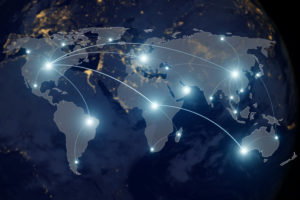
What is the Pandora Papers?
The Pandora Papers is a leak of almost 12 million documents exposing the hidden wealth and offshore dealings of the world’s most rich and powerful people to avoid tax, and in some cases also engage in criminal activities such as money laundering.
The data, originating from the confidential records of 14 offshore services firms from around the world, was obtained by the International Consortium of Investigative Journalists (ICIJ) in Washington DC. More than 600 journalists in 117 countries have participated in the research, making it the biggest ever global investigation.
The leaked documents uncovered financial secrets of 35 current and former world leaders, more than 330 politicians and public officials including government ministers, judges and military generals in 91 countries and territories, and 130 billionaires, as well as celebrities, fraudsters, drug dealers, royal family members and leaders of religious groups around the world.
For example, reports related to Politically Exposed Persons (PEPs) include:
- Jordan’s King Abdullah funnelled $100m through secret companies to buy luxury homes
- Czech Prime Minister secretly bought lavish French Riviera estate using offshore companies
- As Kenyan president mounted anti-corruption comeback, his family’s secret fortune expanded offshore
- Former British Prime Minister Tony Blair bought property via offshore firm and saved £300,000 in tax
Use of Offshore Shell Companies – Most Common Money Laundering Scheme
The Pandora Papers join the growing list of significant offshore leaks since the release of Panama Papers in 2016 and Paradise Papers in 2017. Although establishing offshore is not necessarily illegal, on the contrary, there are lawful and legitimate reasons in some cases for holding assets offshore, such as transferring assets to a more politically stable country or facilitating international investments. However, the use of offshore or shell companies exposes vulnerabilities and threats to illicit activities.
Offshore shell companies and trusts play a vital role in money laundering and terrorist financing activity. Both corporate structures are frequently misused by illicit actors to conceal beneficial ownership, source of funds and transactional information. The lack of ownership transparency gives fraudsters opportunities to bypass Anti-Money Laundering (AML) and Countering the Financing of Terrorism (CFT) regulations.
Indeed, government authorities including UK, Australia, Spain, Brazil, Mexico, etc, announced subsequential investigations on the Pandora documents. It proves that the use of offshore financial structures invites scrutiny and suspicion.
Wait… Why Not Ban Shell Companies?
It is a well-known fact that criminals or corrupt individuals like to use shell companies to hide their real identities. Shell companies are companies that do not have substantial business activities. These companies could be incorporated outside the jurisdiction where these criminals and corrupt individuals are based and hence are termed as “offshore companies”. The favourite jurisdictions to incorporate offshore companies are in jurisdictions where tax is low (or zero) and have very few compliance regulations. Jurisdictions like Cayman Islands and British Virgin Islands are preferred destinations for offshore companies.
So, if offshore shell companies are abused by criminals and corrupt individuals for money laundering, why not just ban them?
Although offshore shell companies are frequently used to launder illicit funds, they do have their legitimate uses. For instance, in mergers and acquisitions, shell companies could be created to transfer assets or liabilities. Wealthy individuals use trusts to hold their wealth as these provide certain level of secrecy and privacy. Maintaining secrecy and privacy of one’s wealth is legitimate for the same reason one would not want their bank statements to be publicized.
As sensational and newsworthy as leaks like Pandora Papers are, shell companies used by bad actors form a small percentage of the worldwide shell companies formed for legitimate purposes. Banning use of shell companies is not only difficult to enforce, it could also discourage wealth creation.
A feasible approach (which is adopted worldwide) is to make it difficult for bad actors to abuse shell companies to launder illicit gains by denying them the opaqueness in forming shell companies and using these companies to perform transactions. In most jurisdictions, businesses with higher money laundering risk exposure are regulated in that preventive measures like due diligence need to be performed when dealing with high-risk transactions. These measures make it harder for criminals to make use of shell companies to, for instance, open bank accounts, transfer funds, buy or sell assets like gold bars or real estates. In addition, through these measures, audit trails are left behind for law enforcement agencies investigating into criminal activities.
Pandora Papers – What Does it Mean if My Customer is on the List?
Fundamentally, it does not mean that an individual, no matter how rich or powerful, is doing something illegal if he or she is exposed in Pandora Papers. The database does not provide the context in which the individual’s name appear in the database. One could also argue the veracity of the information provided in the database since there is no independent verification of the documents. Hence, unless formal investigations and charges have been initiated on the individuals (or entities), being listed on Pandora Papers is nothing more than an interesting story or a piece of news.
Final Thoughts
Shell companies have legitimate use in the corporate world. It is important for professional firms and businesses to ensure that they are not doing businesses with bad actors who are making use of shell companies to launder ill-gotten gains. Preventive measures like customer due diligence and ongoing monitoring of the business relationship are fundamental in identifying suspicious characters or transactions. Commercial AML screening tools such as Dow Jones and SentroWeb, with the features of screening, customer due diligence and ongoing monitoring, can be leveraged for managing the risks efficiently. If professional firms and businesses are satisfied that their preventive measures are effective, there is no need to be too concern about unverifiable leaks such as Pandora Papers.
Recent Posts:
- 2025 New Updates on Companies Registry’s Guideline on AML/CFT for TCSPs – Overview and Practical Guidance to Comply with the Latest Requirements
- Understanding Trade-Based Money Laundering (TBML): Techniques, Case Study, Red Flags and Best Practices for Risk Mitigation
- AML/CFT Regulations in Malaysia: Unpacking the Differences Between SSM and BNM Regulations



